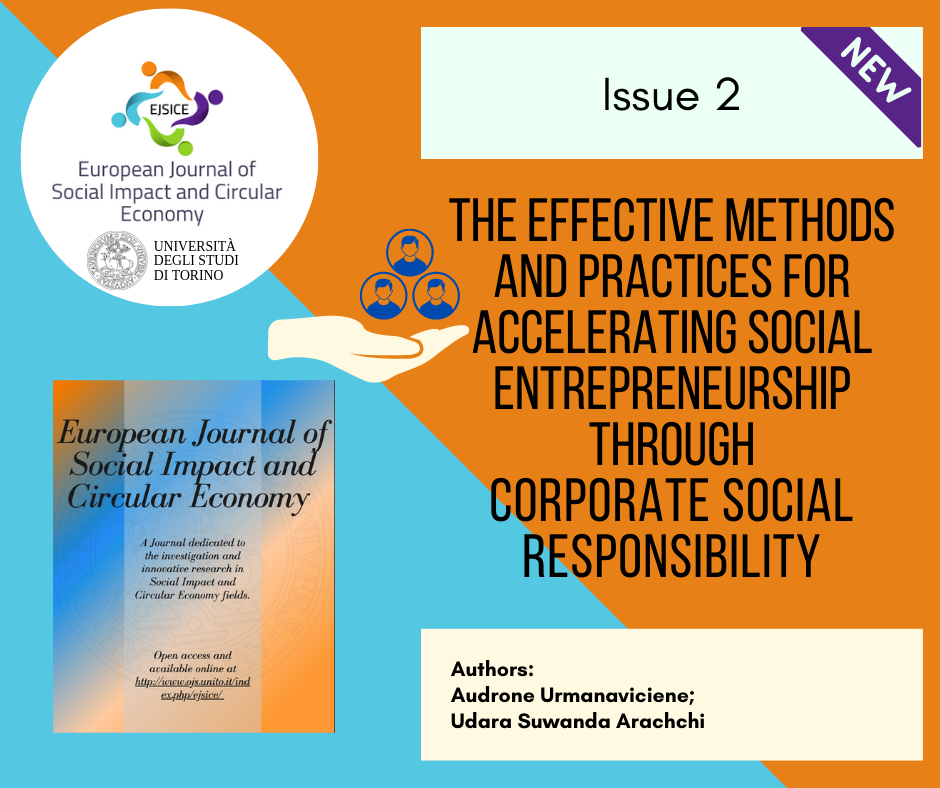The effective methods and practices for accelerating social entrepreneurship through corporate social responsibility
DOI:
https://doi.org/10.13135/2704-9906/5085Keywords:
Corporate culture, Effective methods, Social enterprise, Social impact, Social value creation, SustainabilityAbstract
The concepts of Social entrepreneurship and Corporate Social Responsibility have similar values from the social value perspective. Social entrepreneurship focuses on solving social issues, creating a positive social impact in an innovative entrepreneurial way, and profit maximization is not the primary target. Corporations focus on creating economic values and profit maximization; and use the CSR concept as a tool to maintain socially responsible business conduct. Both CSR and social entrepreneurship concepts represent the same sustainable values in different ways. Thus, finding effective methods for accelerating social entrepreneurship through CSR activities will be fruitful for the betterment of the corporation’s stakeholders, social entrepreneurs, and society at large. This paper aims to explore the current CSR activities of corporations that influence social entrepreneurship development and to identify the most effective methods/practices to accelerate social entrepreneurship. This study follows the qualitative inductive research methodology; and, the content analysis method has been used to analyze the collected data through the in-depth semi-structured expert interviews. It has been found that the current CSR practices for social entrepreneurship development are comparatively less than other community development and philanthropic considerations. Moreover, the challenges for social entrepreneurs and the expectations of corporations have been thoroughly discussed. The effective methods and practices have been suggested for both corporations and social entrepreneurs to accelerate social entrepreneurship by CSR activities with mutual benefits and creating social value; as a win-win situation.
References
Bonini, S. M. J., Mendonca, L. T., and Oppenheim, J. M., (2006), When social issues become strategic?, The McKinsey Quarterly, 2, 20-31.
Carroll, A. B., (1979), A three-dimensional conceptual model of corporate performance. Academy of Management Review, 4(4), 497-505. DOI - 10.2307/257850.
Chandler, D., (2016), Strategic corporate social responsibility: sustainable value creation, United States of America: SAGE Publications.
Dees, J. G., (1998), The meaning of social entrepreneurship.
Dees, J. G., and Anderson, B. B., (2006), Framing a theory of Social Entrepreneurship: Building on two schools of practice and thought, Research on Social Entrepreneurship.
European Commission SWD (2019), Corporate Social Responsibility, Responsible Business Conduct, and Business & Human Rights: Overview of Progress, Commission Staff Working Document, 2019.03.20
Fernando, S., Lawrance, S., (2015), CSR practices - A comparison between a developed and developing country, Proceedings of the Environmental and Sustainability Management Accounting Network (Eman) Global Conference 2015.
Gallardo-Vázquez, D., Valdez-Juárez, L. E., & Castuera-Díaz, Á. M. (2019), Corporate social responsibility as an antecedent of innovation, reputation, performance, and competitive success: A multiple mediation analysis. Sustainability, 11(20), 5614.
Galbreath, J., (2009), Building corporate social responsibility into strategy. European Business Review, 21(2), 109 127. DOI 10.1108/09555340910940123.
Heslin, P. A., & Ochoa, J. D., (2008), Understanding and developing strategic corporate social responsibility, Organizational Dynamics 37(2), 125–144.
Husted, B. W., & Allen, D. B., (2007), Strategic corporate social responsibility and value creation among large firms: Lessons from the Spanish experience, Long Range Planning, 40(6), 594–610.
Jamali, D., (2007), The Case for Strategic Corporate Social Responsibility in Developing Countries, Business and Society Review, 112(1), pp.1–27.
Johnson, S., (2000), Literature Review on Social Entrepreneurship. Alberta: Canadian Centre for Social Entrepreneurship.
Lantos, G. P., (2001), The boundaries of strategic corporate social responsibility, Journal of Consumer Marketing, 18(7), 595–632.
Mair, J. and Marti, I., (2009), Entrepreneurship in and around institutional voids: a case study from Bangladesh, Journal of Business Venturing, Vol. 24 No. 5, pp. 419-435.
Marrewijk, M., (2003), Concepts and Definitions of CSR and Corporate Sustainability, Between Agency and Communion (Vol. 44).
Moir, L., (2001), What Do We Mean By Corporate Social Responsibility? Corporate Governance, (Vol.1) Issue: 2, P. 16-22.
Nicholls, A., (2006), “Introduction”, in A. Nicholls (Ed.), Social Entrepreneurship. New Models of Sustainable Social Change, Oxford University Press.
OECD (1999), “Social Enterprises”, OECD Publishing, Paris.
Porter, M.E. and Kramer, M. R., (2011), Creating Shared Value-how to reinvent capitalism-and unleash a wave of innovation and growth. Harvard Business Review, pp. 62–77.
Seelos, C. & Mair, J., (2005), Social entrepreneurship: Creating new business models to serve the poor, Business Horizons 48, 241 — 246.
Singh, A., (2016), The process of social value creation: A multiple case study on social entrepreneurship in India.
Smith, N. C., (2001), Changes in corporate practices in response to public interest advocacy and actions, In P. N. B. a. G. T. Gundlach (Ed.), Handbook of Marketing and Society; Thousand Oaks.
Thompson, J., Alvy, G., Lees, A., (2000), Social Entrepreneurship: A new look at the people and the potential, Management Decision, 38(5), 328-338.
Tommaso, R. & Antonino, V., (2014), Stakeholders Matter: How Social Enterprises Address Mission Drift. Journal of Business Ethics.
Werther, W. B., & Chandler, D., (2005), Strategic corporate social responsibility as global brand insurance. Business Horizons, 48(4), 317–324.


 EJSICE has been approved for inclusion in DOAJ. The DOAJ listing of the journal is available at
EJSICE has been approved for inclusion in DOAJ. The DOAJ listing of the journal is available at  EJSICE is a member of
EJSICE is a member of  EJSICE is indexed by
EJSICE is indexed by  EJSICE is listed in the ANVUR (Italian National Agency for the Evaluation of Universities and Research Institutes) as a scientific journal in AREA 13 - Economic and Statistical Sciences and AREA 14 - Political and Social Sciences.
EJSICE is listed in the ANVUR (Italian National Agency for the Evaluation of Universities and Research Institutes) as a scientific journal in AREA 13 - Economic and Statistical Sciences and AREA 14 - Political and Social Sciences. 

